Poll: Fear factor
Minnesotans report unprecedented concerns over personal safety in their post-riot communities.
The “George Floyd” riots that tore through the Twin Cities for five days last May have left an unprecedented number of Minnesotans still feeling insecure about their personal safety, according to data revealed in the fall edition of the Thinking Minnesota Poll.
Meeting Street Insights, a Charleston, S.C.-based polling company, interviewed 500 registered Minnesota voters between September 1-3, using a mix of cell phones and landlines. According to Meeting Street’s founder Rob Autry who oversaw the project, the survey’s margin of error is ±4.38 percent.
Political observers are hard-pressed to recall a previous time when “personal safety” occupied the top concern for Minnesotans statewide going into a presidential election. And frustrations extended beyond worries about safety. By wide margins, Minnesotans also expressed irritation that “rioters, looters and arsonists” have received inadequate punishment for their behavior, rebuking local elected officials for their powerlessness to stop the riots from inflicting excessive damage on the Twin Cities.
Autry’s research also revealed that self-described political independents overwhelmingly agreed with Republican criticism about how public officials handled the riots.
Overall, 53 percent of Minnesotans said “public safety is now more important of a priority than other issues” (Figure 1).
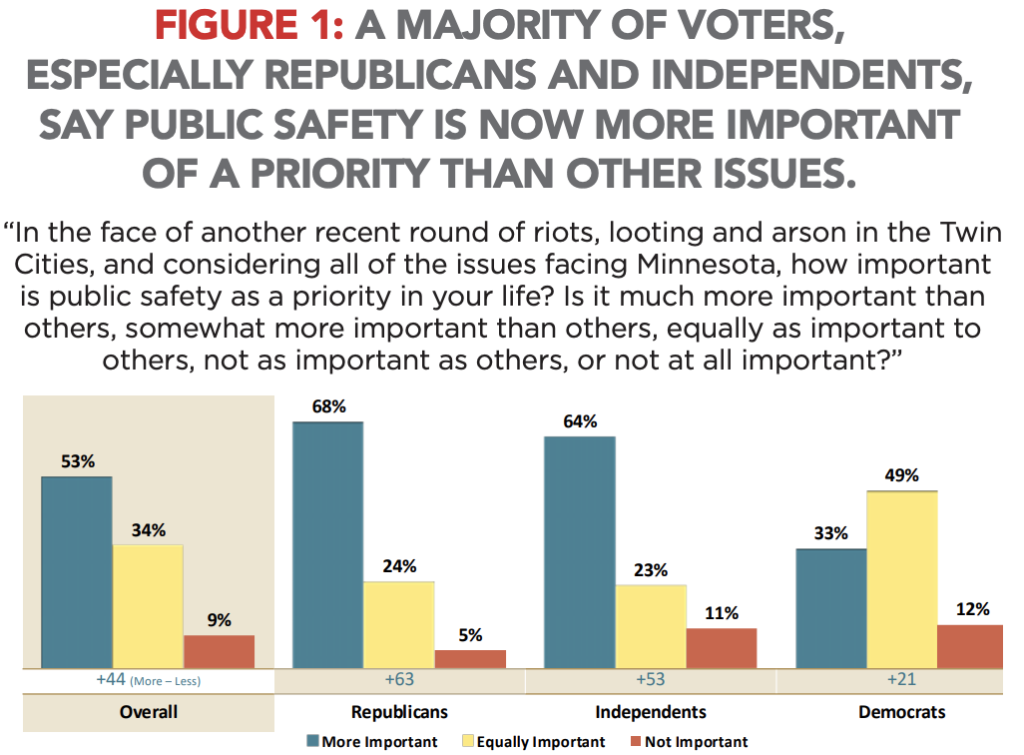
That number jumps to 68 percent among Republican respondents and 64 percent among Independents, while only 33 percent of Democrats expressed worry about personal safety. Younger residents had less insecurity about public safety, at 35 percent, according to the survey (Figure 2). Otherwise, those concerns generally increased with age, averaging between 53 and 60 percent among older age groups.
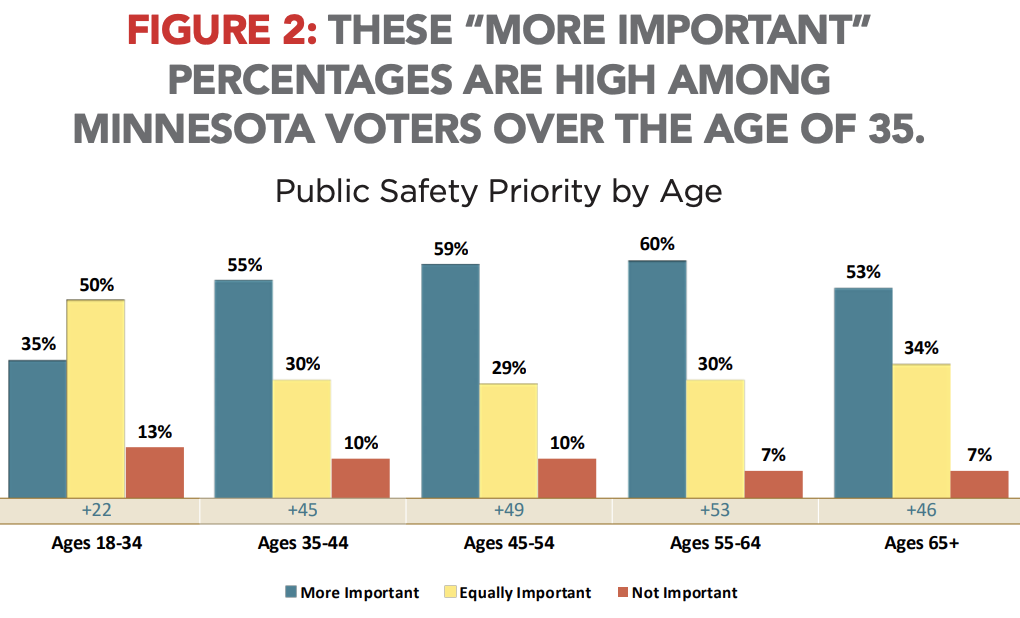
John Hinderaker, president of Center of the American Experiment, says it is not difficult to analyze these numbers’ significance.
“All Minnesotans were shocked by the violence of the George Floyd riots, and then the subsequent disorder, including the looting of Nicollet Mall,” he says. “The people of this state have never seen destruction, arson, rioting and looting on that scale.”
What’s more, 54 percent of Minnesotans who say public safety is of paramount importance do not think state and local government is up to the challenge of responding to the current public safety crisis (Figure 3). Fully 28 percent have “not much” confidence; 26 percent have “no confidence at all.” Overall, respondents showed slightly more certainty in the capabilities of their elected officials. Forty percent cited “some” confidence in them, while just 14 percent reflected “a lot of confidence.”
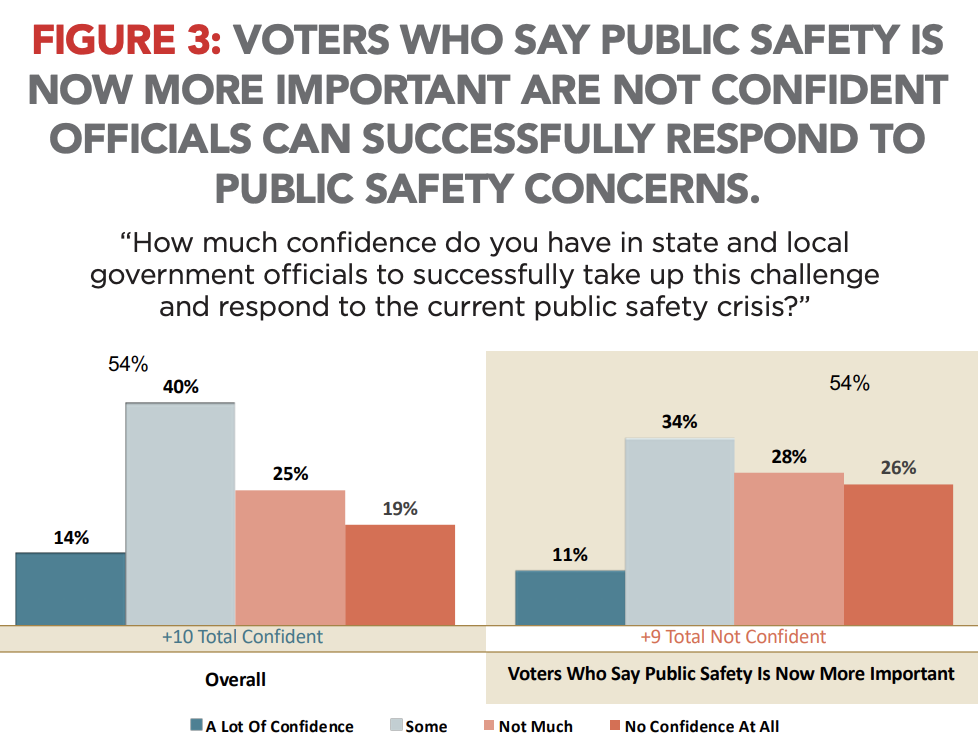
Strong majorities—consisting mainly of Republicans and Independents—voiced intense disapproval about how the rioters took control of the cities with apparent immunity from punishment (Figure 4). By a margin of three-to-one—70 percent to 23 percent—voters agreed that “the rioters, looters and arsonists” did not receive adequate blame for the damage they have caused. This dissatisfaction is felt even more intensely by Republicans (88 percent) and Independents (79 percent) (Figure 5). Only 50 percent of Democrats thought rioters received inadequate punishments.
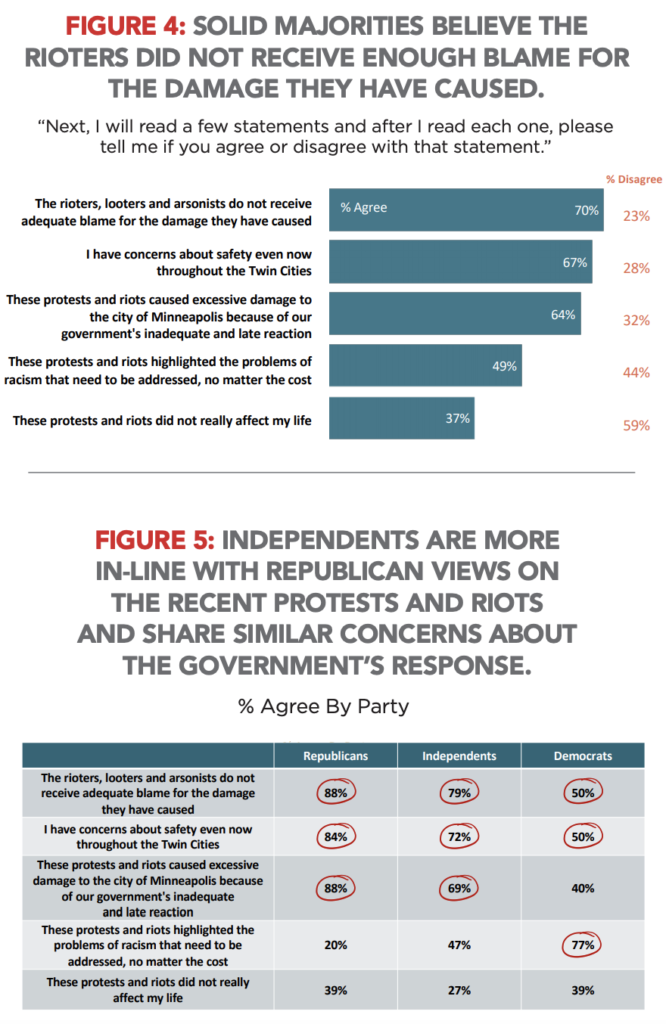
Hinderaker says Republicans and Independents have the correct response.
“There has not been the kind of reckoning that Minnesota needs to see. The police were basically told to stand down, at least initially, as the rioters took over the Third Precinct station. Then we saw the same thing with the looting of Nicollet Mall. There were videos of people smashing windows and walking in and out of stores with armfuls of merchandise—with no law enforcement in sight.”
“Minnesotans hold these opinions because they watched it in real-time on their televisions,” Hinderaker continues. “We all saw what happened. We saw the riots begin. We saw rioters meet inadequate resistance early on and then get totally out of control. If our civic authorities don’t learn a lesson from this, they’re very foolish.”
Minnesotans hold other criticisms of the riots by two-to-one margins, and more.
They “have concerns” about safety in the Twin Cities by 67 percent to 28 percent, with a similar agreement between Republicans (84 percent) and Independents (72 percent). These views are not confined to the metropolitan Twin Cities but are shared by respondents throughout the entire state (Figure 6).
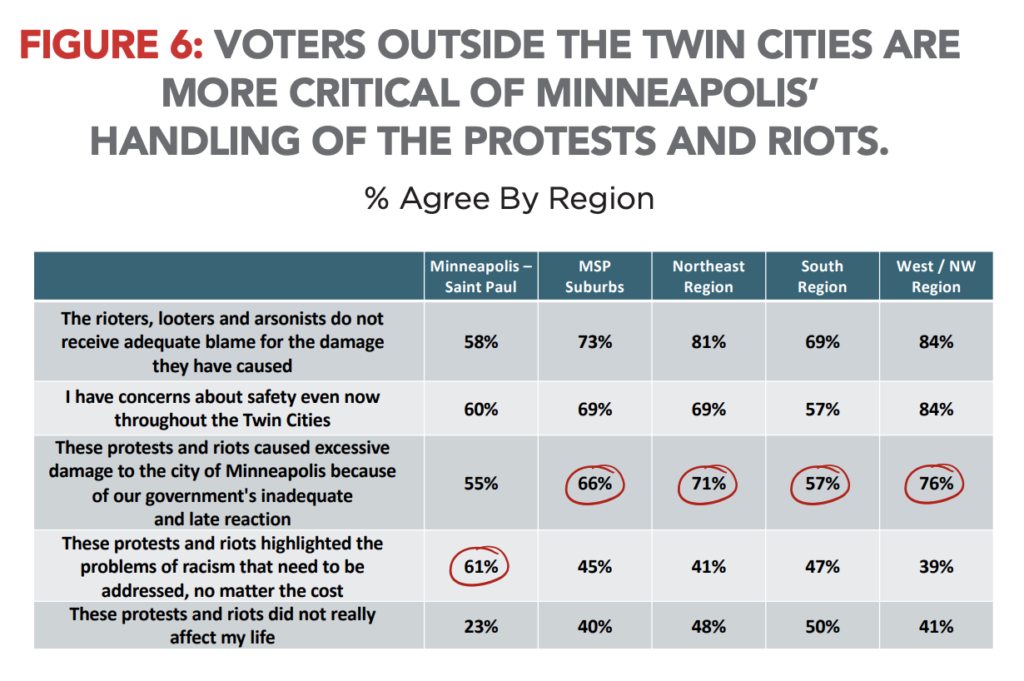
Minnesotans blame the excessive damage to the City of Minneapolis on “government’s inadequate and late reaction” by 62 percent to 32 percent, again an opinion primarily shared by Republicans (88 percent) and Independents (69 percent), but shared by strong majorities statewide.
“Riots have never been popular with the public,” Hinderaker says. “The overwhelming majority of people are adamantly opposed to rioting, looting and arson. They always have been, and I assume they always will be. What’s a little surprising is that there’s anybody who is muted in his or her condemnation of these illegal acts.”
School openings
In news related to the pandemic, one in four parents disclosed that they “have looked at alternative schools to provide an in-person learning experience” for their children (Figure 7).
Parents’ view of teachers’ unions also appears to be in decline. Only 36 percent said that they see a “positive impact” of unions on the overall quality of their children’s education (Figure 8).
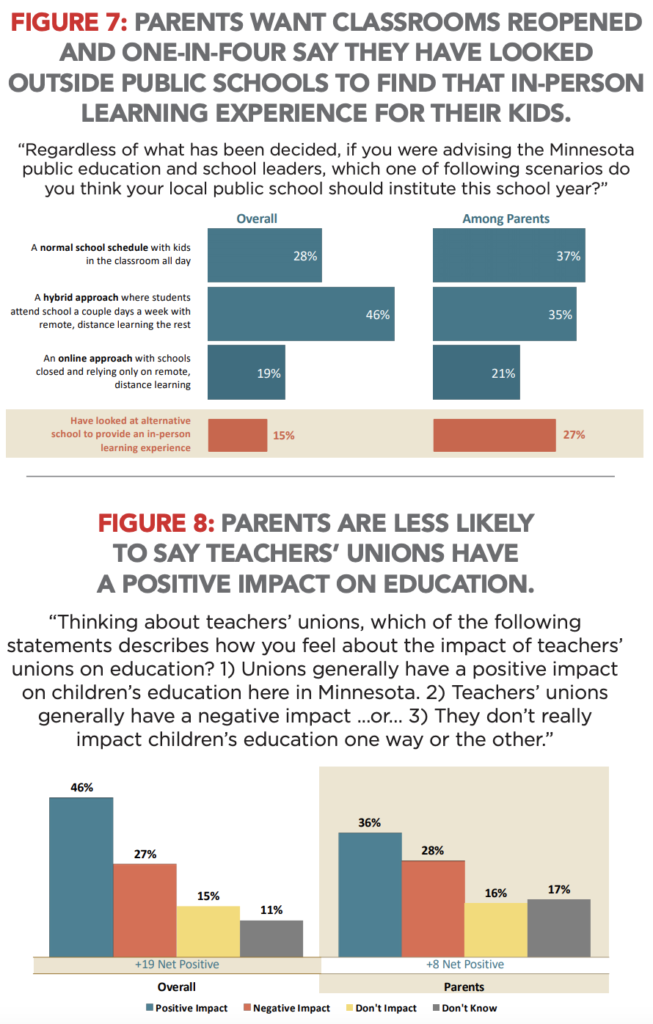
Minnesota’s budget deficit
As the State of Minnesota contemplates large budget deficits related to shutting down the economy, an overwhelming number of its citizens think the legislature should address the shortfalls through spending cuts (59 percent) rather than raising taxes (20 percent) (Figure 9).
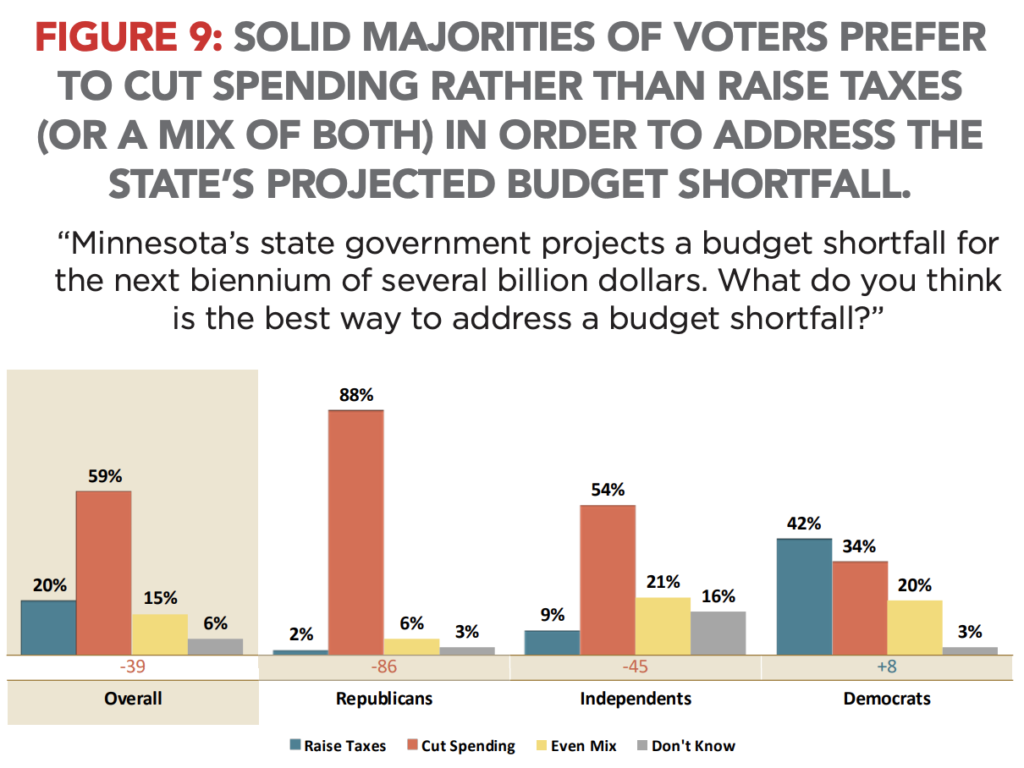
Republicans feel especially adamant on the issue — 88 percent support spending cuts, two percent support increased taxes.
Hinderaker hopes the finding is “very compelling” to legislators. “Millions of Minnesotans are going through a very difficult time,” he says. “A lot of people lost their jobs. A lot of small businesses have been devastated. I think most people believe it’s only right that the government should tighten its belt, just like its citizens have had to.”